八年级英语上册Unit7Seasons词汇与语法基础训练(新版)牛津版
- 格式:doc
- 大小:97.50 KB
- 文档页数:20
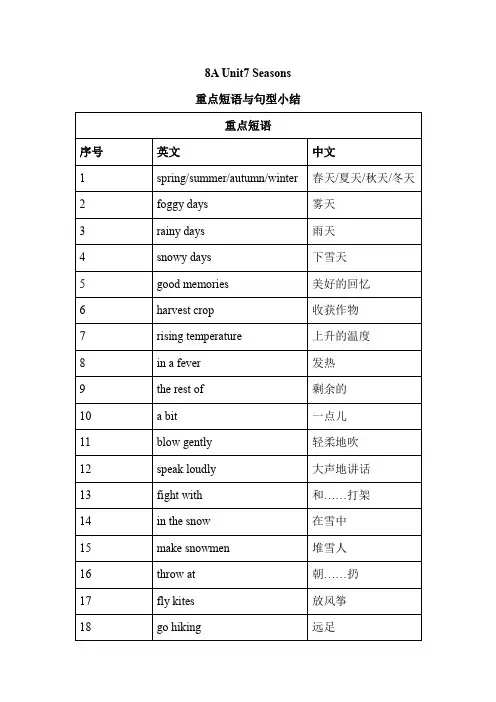
8A Unit7 Seasons 重点短语与句型小结默写卷1.春天/夏天/秋天/冬天__________________2.雾天__________________3.雨天__________________4.下雪天__________________5.美好的回忆__________________6.收获作物__________________7.上升的温度__________________8.发热__________________9.剩余的__________________10.一点儿__________________11.轻柔地吹__________________12.大声地讲话__________________13.和……打架__________________14.在雪中__________________15.堆雪人__________________16.朝……扔__________________17.放风筝__________________18.远足__________________19.游泳__________________20.爬山__________________21.充满__________________22.风和日丽__________________23.感到凉爽__________________24.飞走__________________25.在地面上__________________26.我最喜欢的季节时秋天因为它是在外面踢足球的最好时间。
________________________________________________________ 27.我最喜欢夏天因为我可以每天去游泳,吃冰淇淋。
________________________________________________________ 28.春天的日子风和日丽,这是放风筝的最佳时间。
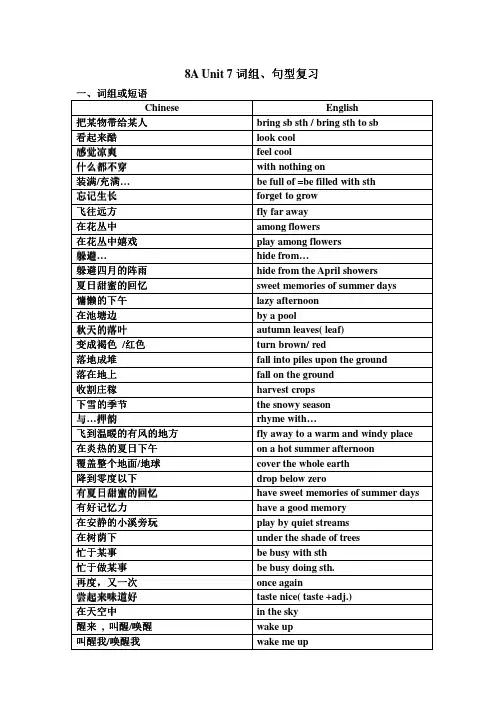
8A Unit 7词组词组、、句型复习一、词组或短语Chinese English把某物带给某人 bring sb sth / bring sth to sb看起来酷 look cool 感觉凉爽 feel cool 什么都不穿 with nothing on 装满/充满… be full of =be filled with sth 忘记生长 forget to grow 飞往远方 fly far away在花丛在花丛中中among flowers在花丛中嬉戏 play among flowers 躲避…hide from…躲避四月的阵雨 hide from the April showers 夏日甜蜜的回忆 sweet memories of summer days 慵懒的下午 lazy afternoon 在池塘边 by a pool秋天的落叶 autumn leaves( leaf) 变成褐色 /红色 turn brown/ red落地成堆 fall into piles upon the ground 落在地上 fall on the ground 收割庄稼 harvest crops 下雪的季节 the snowy season 与…押韵 rhyme with…飞到温暖的飞到温暖的有有风的地方 fly away to a warm and windy place 在炎热的夏日在炎热的夏日下下午 on a hot summer afternoon 覆盖整个地面/地球 cover the whole earth 降到零度以下drop below zero有夏日甜蜜的回忆 have sweet memories of summer days 有好记忆力have a good memory 在安静的小溪旁玩 play by quiet streams 在树荫下 under the shade of trees 忙于某事 be busy with sth 忙于做某事 be busy doing sth. 再度再度,,又一次 once again尝起来味道好 taste nice( taste +adj.) 在天空中in the sky 醒来 , 叫醒/唤醒 wake up 叫醒叫醒我我/唤醒唤醒我我wake me up在下雨天/下雪天 on rainy/snowy days 从早到晚 from morning till night 踢球kick the ball 看见某人正在做某事 see sb doing sth感冒 have/catch a cold 重感冒 have/catch a bad cold 发高烧 have a high fever 咳嗽厉害 cough a lot 糟糕的一天an awful day在傍晚/在下午晚一点过来/在傍晚时分 in the late afternoon 降到零度以下 drop/fall below zero下降到零下十度 drop/fall to minus ten degrees/ ten degrees below zero 变得更变得更加加乌云密布turn more cloudy 9度左右 around nine degrees 在白天 during the day 在夜里 at night30多度in the thirties 在她三十多岁时in her thirties …的其余部分 the rest of…最低气温 the lowest temperature 最高气温 the highest temperature 保持在零度以上 stay above zero在每年的这个时候 during this time of year 有一点 a bit有一点有一点冷冷 a bit cold=a little cold有一点有一点水水 a bit of water=a little water 当心,保重 take care用…遮住…cover… with…用手遮住他的眼睛 cover his eyes with your hands 起来滑稽look funny使他们看起来滑稽 make them look funny 使人们昏昏欲睡 make them sleepy 突然来临的暴雨 the sudden heavy rain 引起很多问题 cause a lot of problems 一年中最好的季节the best season of the year 短途短途旅行旅行 have a short trip环城环城短途旅行短途旅行 have a short trip around the city (打)雪球仗 (have )snowball fights 大雾heavy fog被厚厚的白雪覆盖 be covered in deep white snow 被覆盖被覆盖…… be covered with sth 相互扔雪球 throw snowballs at each other 堆雪人 make snowmen 用胡萝卜做它们的鼻子 use carrots for their noses 二、重点句子及句型重点句子及句型::1. I bet you’ll look cool and feel cool with nothing on.我敢说你不穿衣服看上去我敢说你不穿衣服看上去酷而且感觉凉爽酷而且感觉凉爽酷而且感觉凉爽。
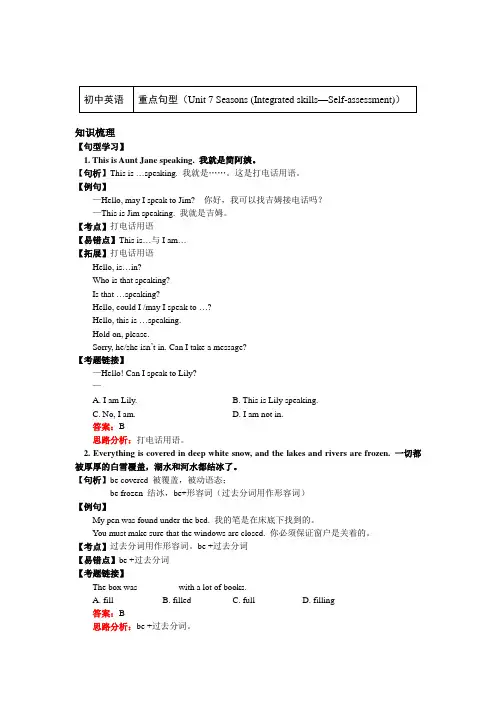
知识梳理【句型学习】1. This is Aunt Jane speaking. 我就是简阿姨。
【句析】This is …speaking. 我就是……。
这是打电话用语。
【例句】—Hello, may I speak to Jim? 你好,我可以找吉姆接电话吗?—This is Jim speaking. 我就是吉姆。
【考点】打电话用语【易错点】This is…与I am…【拓展】打电话用语Hello, is…in?Who is that speaking?Is that …speaking?Hello, could I /may I speak to …?Hello, this is …speaking.Hold on, please.Sorry, he/she isn’t in. Can I take a message?【考题链接】—Hello! Can I speak to Lily?—_______________A. I am Lily.B. This is Lily speaking.C. No, I am.D. I am not in.答案:B思路分析:打电话用语。
2. Everything is covered in deep white snow, and the lakes and rivers are frozen. 一切都被厚厚的白雪覆盖,湖水和河水都结冰了。
【句析】be covered 被覆盖,被动语态;be frozen 结冰,be+形容词(过去分词用作形容词)【例句】My pen was found under the bed. 我的笔是在床底下找到的。
You must make sure that the windows are closed. 你必须保证窗户是关着的。
【考点】过去分词用作形容词。
be +过去分词【易错点】be +过去分词【考题链接】The box was _________with a lot of books.A. fillB. filledC. fullD. filling答案:B思路分析:be +过去分词。
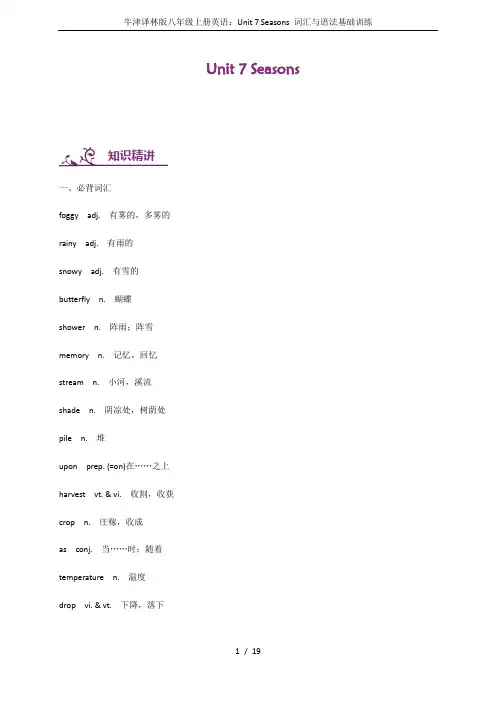
一、必背词汇foggy adj. 有雾的,多雾的rainy adj. 有雨的snowy adj. 有雪的butterfly n. 蝴蝶shower n. 阵雨;阵雪memory n. 记忆,回忆stream n. 小河,溪流shade n. 阴凉处,树荫处pile n. 堆upon prep. (=on)在……之上harvest vt. & vi. 收割,收获crop n. 庄稼,收成as conj. 当……时;随着temperature n. 温度drop vi. & vt. 下降,落下Unit 7 Seasons知识精讲rise vi. 上升;升起kick vt. 踢fever n. 发烧cough vi. 咳嗽land n. 陆地exciting adj. 激动人心的throw vt. 扔,投,掷snowman n. (pl. snowmen ) 雪人scream vi. & vt. 尖叫,惊呼everywhere adv. 到处bet vt. & vi. 打赌;敢说shine n. 光亮,光泽cause vt. 引起,使发生awful adj. 糟糕的,很坏的wind n. 风around adv. 大约snowstorm n. 暴风雪sunshine n. 阳光rest n. 其余的部分(人)degree n. 度数bit n. 一点,少量blow vi. & vt. 吹;刮loud adv. 大声地ring vt. & vi. 给……打电话;响起铃声sleepy adj. 困倦的;瞌睡的shiny adj. 光亮的;反光的sudden adj. 突然的snowball n. 雪球fight n. 打仗(架)deep adj. 深的frozen adj. 结冰的二、重点词汇1. as adverb & preposition & conjunction /æz/1). adv. used in comparisons to refer to the degree of something:和……一样例句:She’ll soon be as tall as her mother.她马上就和她妈妈一样高了。
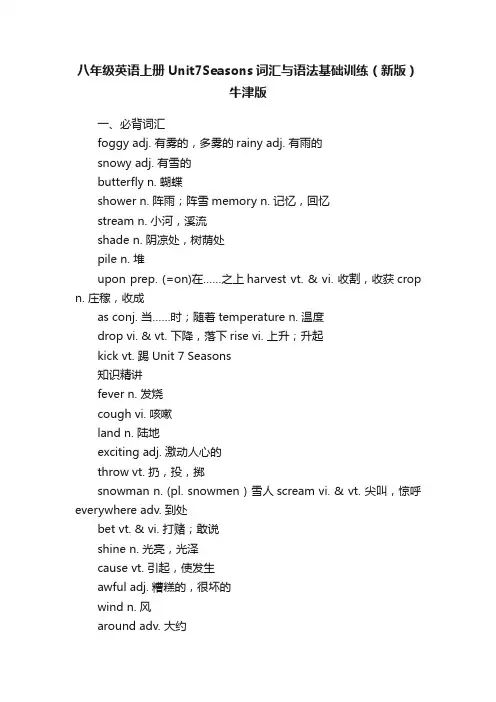
八年级英语上册Unit7Seasons词汇与语法基础训练(新版)牛津版一、必背词汇foggy adj. 有雾的,多雾的rainy adj. 有雨的snowy adj. 有雪的butterfly n. 蝴蝶shower n. 阵雨;阵雪memory n. 记忆,回忆stream n. 小河,溪流shade n. 阴凉处,树荫处pile n. 堆upon prep. (=on)在……之上harvest vt. & vi. 收割,收获crop n. 庄稼,收成as conj. 当……时;随着temperature n. 温度drop vi. & vt. 下降,落下rise vi. 上升;升起kick vt. 踢Unit 7 Seasons知识精讲fever n. 发烧cough vi. 咳嗽land n. 陆地exciting adj. 激动人心的throw vt. 扔,投,掷snowman n. (pl. snowmen ) 雪人scream vi. & vt. 尖叫,惊呼everywhere adv. 到处bet vt. & vi. 打赌;敢说shine n. 光亮,光泽cause vt. 引起,使发生awful adj. 糟糕的,很坏的wind n. 风around adv. 大约snowstorm n. 暴风雪sunshine n. 阳光rest n. 其余的部分(人)degree n. 度数bit n. 一点,少量blow vi. & vt. 吹;刮loud adv. 大声地ring vt. & vi. 给……打电话;响起铃声sleepy adj. 困倦的;瞌睡的shiny adj. 光亮的;反光的sudden adj. 突然的snowball n. 雪球fight n. 打仗(架)deep adj. 深的frozen adj. 结冰的二、重点词汇1. as adverb & preposition & conjunction /?z/1). adv. used in comparisons to refer to the degree of something:和……一样例句:She’ll soon be as t all as her mother.她马上就和她妈妈一样高了。
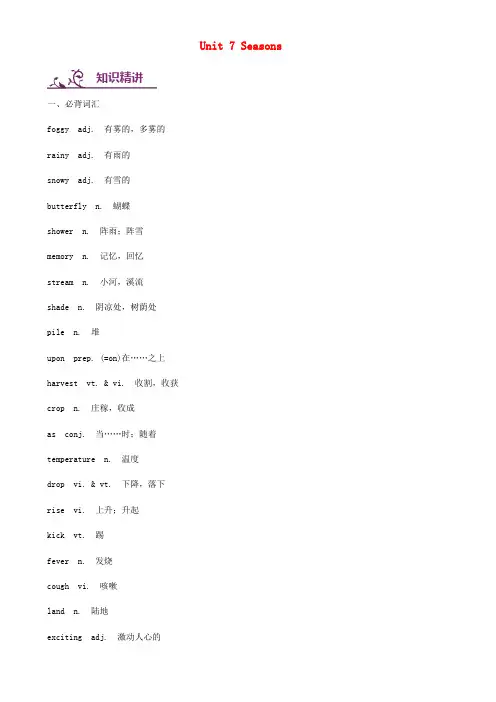
一、必背词汇foggy adj. 有雾的,多雾的rainy adj. 有雨的snowy adj. 有雪的butterfly n. 蝴蝶shower n. 阵雨;阵雪memory n. 记忆,回忆stream n. 小河,溪流shade n. 阴凉处,树荫处pile n. 堆upon prep. (=on)在……之上harvest vt. & vi. 收割,收获crop n. 庄稼,收成as conj. 当……时;随着temperature n. 温度drop vi. & vt. 下降,落下rise vi. 上升;升起kick vt. 踢fever n. 发烧cough vi. 咳嗽land n. 陆地exciting adj. 激动人心的Unit 7 Seasons知识精讲throw vt. 扔,投,掷snowman n. (pl. snowmen ) 雪人scream vi. & vt. 尖叫,惊呼everywhere adv. 到处bet vt. & vi. 打赌;敢说shine n. 光亮,光泽cause vt. 引起,使发生awful adj. 糟糕的,很坏的wind n. 风around adv. 大约snowstorm n. 暴风雪sunshine n. 阳光rest n. 其余的部分(人)degree n. 度数bit n. 一点,少量blow vi. & vt. 吹;刮loud adv. 大声地ring vt. & vi. 给……打电话;响起铃声sleepy adj. 困倦的;瞌睡的shiny adj. 光亮的;反光的sudden adj. 突然的snowball n. 雪球fight n. 打仗(架)deep adj. 深的frozen adj. 结冰的二、重点词汇1. as adverb & preposition & conjunction /æz/1). adv. used in comparisons to refer to the degree of something:和……一样例句:She’ll soon be as t all as her mother.她马上就和她妈妈一样高了。
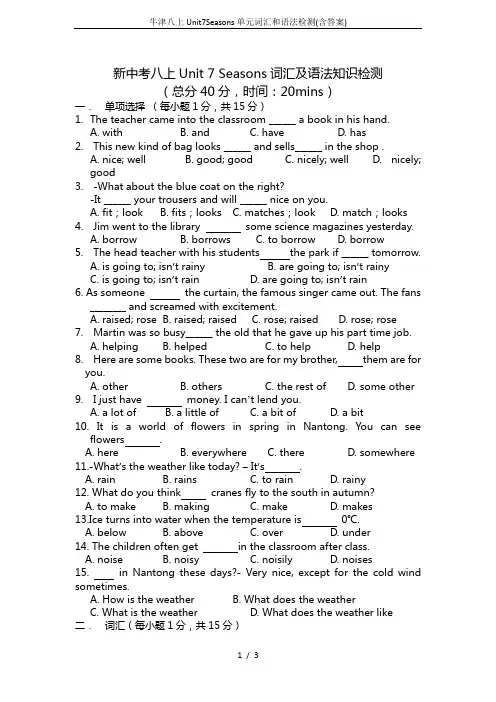
新中考八上Unit 7 Seasons词汇及语法知识检测(总分40分,时间:20mins)一.单项选择(每小题1分,共15分)1.The teacher came into the classroom ______ a book in his hand.A. withB. andC. haveD. has2. This new kind of bag looks ______ and sells______ in the shop .A. nice; wellB. good; goodC. nicely; wellD. nicely;good3. -What about the blue coat on the right?-It ______ your trousers and will ______ nice on you.A. fit;lookB. fits;looksC. matches;lookD. match;looks4. Jim went to the library some science magazines yesterday.A. borrowB. borrowsC. to borrowD. borrow5. The head teacher with his students the park if ______ tomorrow.A. is going to; isn’t rainyB. are going to; isn’t rainyC. is going to; isn’t rainD. are going to; isn’t rain6. As someone the curtain, the famous singer came out. The fans________ and screamed with excitement.A. raised; roseB. raised; raisedC. rose; raisedD. rose; rose7. Martin was so busy______ the old that he gave up his part time job.A. helpingB. helpedC. to helpD. help8. Here are some books. These two are for my brother, them are for you.A. otherB. othersC. the rest ofD. some other9. I just have money. I can’t lend you.A. a lot ofB. a little ofC. a bit ofD. a bit10. It is a world of flowers in spring in Nantong. You can seeflowers .A. hereB. everywhereC. thereD. somewhere11.-What’s the weather like today? – It’s .A. rainB. rainsC. to rainD. rainy12. What do you think cranes fly to the south in autumn?A. to makeB. makingC. makeD. makes13.Ice turns into water when the temperature is 0℃.A. belowB. aboveC. overD. under14. The children often get in the classroom after class.A. noiseB. noisyC. noisilyD. noises15. in Nantong these days?- Very nice, except for the cold wind sometimes.A. How is the weatherB. What does the weatherC. What is the weatherD. What does the weather like 二.词汇(每小题1分,共15分)A.根据句意及首字母或汉语提示完成单词。

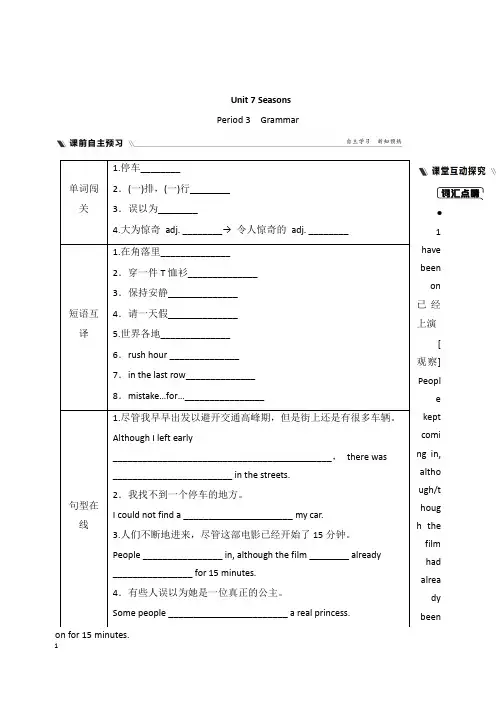
Unit 7 Seasons Period 3Grammar●1 have been on 已经上演[观察] People kept comi ng in, altho ugh/t houg h the film had alrea dy beenon for 15 minutes.人们不断地进来,尽管这部电影已经开始了15分钟。
He has been out for two days. 他已出门两天了。
Tom has been away for a week. 汤姆离开一周了。
[探究] have been可以与away, back, in, on, out等词连用,表示某种状态,可以与for 或since等引导的表示时间段的时间状语连用。
1.2017·乐山改编—I'm sorry for being late.—Never mind. The meeting ________ for only 5 minutes. This way, please.A.has begunB.has endedC.has been onD.has on●2mistake…for… 把……误认为……[观察] Some people mistook her for a real princess.有些人误以为她是一位真正的公主。
[探究] mistake n. 错误,过失;v. 看错,误解mistake…for…把……误认为……[拓展] make a mistake/make mistakes意为“犯错,出错”,若表示“在某一方面出错”,用介词in。
2.2017·无锡这位男演员演技出众,常被误认为是个真警探。
The actor acts so well ____________________ a real detective.●People kept coming in, although the film had already been on for 15 minutes.人们不断地进来,尽管这部电影已经开始了15分钟。
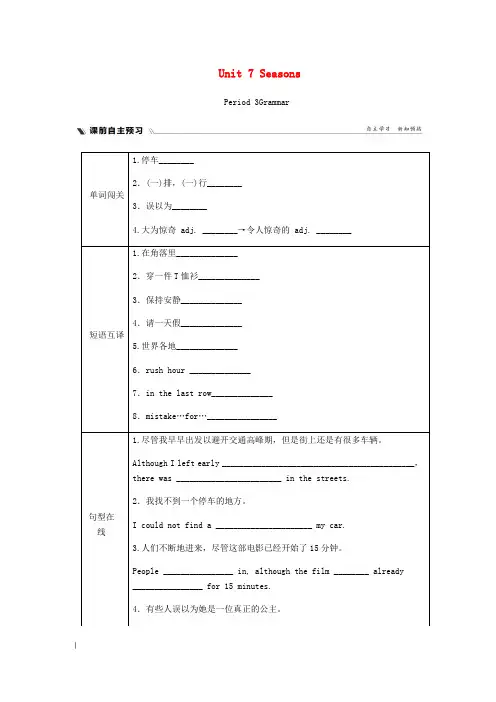
Unit 7 SeasonsPeriod 3Grammar●1have been on 已经上演[观察] People kept coming in, although/though the film had already been on for 15 minutes.人们不断地进来,尽管这部电影已经开始了15分钟。
He has been out for two days.他已出门两天了。
Tom has been away for a week.汤姆离开一周了。
[探究] have been可以与away, back, in, on, out等词连用,表示某种状态,可以与for或since等引导的表示时间段的时间状语连用。
活学活用1.2017·乐山改编—I'msorry for being late.—Never mind. The meeting ________ for only 5 minutes. This way, please.A.has begunB.has endedC.has been onD.has on●2mistake…for…把……误认为……[观察] Some people mistook her for a real princess.有些人误以为她是一位真正的公主。
[探究] mistake n.错误,过失;v.看错,误解mistake…for…把……误认为……[拓展] make a mistake/make mistakes意为“犯错,出错”,若表示“在某一方面出错”,用介词in。
活学活用2.2017·无锡这位男演员演技出众,常被误认为是个真警探。
The actor acts so well ____________________ a real detective.●People kept coming in, although the film had already been on for 15 minutes.人们不断地进来,尽管这部电影已经开始了15分钟。
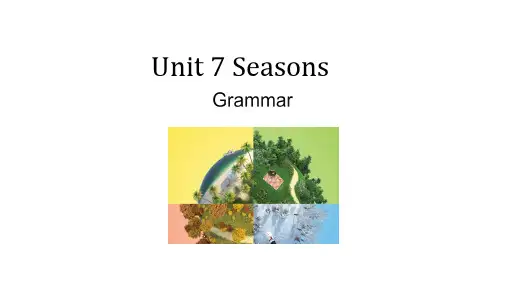
8AU7:Seasons单元重要知识点提升训练一、单项选择1. ---Sandy, what else do you need for your school trip?---____________else. Everything is ready!A. SomethingB. EverythingC. NothingD. Something2. The price of vegetables____________a little last month.A. lowB. droppedC. fellD. fell down3. How________the wind outside_________! It seems that she won't be here on time tonight.A. terrible; is blowingB. terrible; soundsC. terribly; blowsD. terribly; sounds4. The school is___________my home. So I have to go to school by bus.A. far away fromB. nearC. far awayD. away from5. What's the structure of the sentence“We call them giant pandas.”?A. S+V+IO+DOB. S+V+PC. S+V+OD. S+V+DO+OC6. Most of the students are studying, and__________are having__________.A. rest; a restB. the rest; a restC. rest; restD. the rest; rest7. The high mountains____________snow. How beautiful!A. is covered withB. are covered onC. are covered withD. is covered on8. I'm going__________a job, but it's not easy__________a good job.A. to look for; findB. find; look forC. to find; to look forD. to look for; to find9. When the children grow up, they will try to hide___________their parents.A. inB. withC. fromD. away10. It's dangerous___________snowball fights in the street.A. for us to playB. of us playingC. for us playingD. of us to play11. Dad’s birthday is coming. The children are busy_____________the party.A. get ready forB. getting ready forC. get ready onD. getting ready on12. You don't need to buy water. There___________water in the bottle.A. are a fewB. is littleC. are fewD. is a little13. The twins watch their grandpa___________ the flowers in the garden every day.A. watersB. waterC. to waterD. watering14. It's time for David to go to school. Please___________right away.A. wake up himB. wake himC. wake him upD. wake for him15. ---Hi,may I speak to Kitty?--- Hi,_____________________.A. this is Kitty speakingB. I am KittyC. it is KittyD. that is Kitty二、词汇综合运用1.It is such a___________(fog) day! So you must drive more slowly and carefully.2.When spring comes, we can see beautiful____________(butterfly) flying around the flowers.3. ___________(sudden), a strong wind blew away my paper.4.I'm sure you need a___________(health) diet (食谱) if you want to keep fit than before.5.All the students are__________(excite) to hear their favourite team won the game.6.I like the blue sky with some white____________(云).7. After a night's hard work, with no sleep, these workers look very__________(困倦的).8.Please give your new shoes a good___________(光泽).9. Tai Lake is much____________(深) than the river near my home.10. The naughty (淘气的) boy_____________(打架) with his classmate in an Art class.三、动词填空1.We will leave here right away if the heavy rain___________(stop).2. Many people_____________(lose) their lives in the awful earthquake.3. Look! One of the students____________(chat) with his friends on the Internet.4. The bad weather couldn't stop the climbers_________(climb) up to the top of the mountain.5. ---Hi, David. I_____________(not see) you at the party.一Oh, I was on business in Beijing.6. Chinese people________ never________(forget) the earthquake in TangShan in 1976.7. He put his photos on the Internet for us___________(look) at.8. We didn't see snow or ice for years because the temperature_________(not drop) below zero.9. Simon and Daniel were busy____________(prepare) for their exams yesterday afternoon.10. The teacher told us that summer_____________(follow) spring.四、句型转换1. He lent his English book to me yesterday morning. (改为同义句)__________ _________an English book___________ ___________yesterday morning. 2. The little child's mouth is full of food. (改为同义句)The little child's mouth___________ __________ ___________food.3. City life is not the same as country life. (改为同义句)City life__________ ____________ ____________country life.4. On the bus, my sister often gives his seat to old people. (改为同义句)On the bus, my sister often_________old people__________ __________.5. How's the weather in Nanjing today? (改为同义句)________ __________ ____________ ___________in Nanjing today?6. People are lucky to enjoy many sunny days. (改为同义句)___________ ___________ ____________people to enjoy many sunny days.五、完成句子1.春天是放风筝的最佳季节。
Unit 7 Seasons一、从方框里选择合适的单词或词组,并用其适当形式填空。
turn green wind sleep far away forget suddenmake leaf butteryfly sleep1. My parents live and we can't see each other often.2. The _of these trees stay green all year rounnd.3. It makes them look4. The grass will next spring.5. I like to watch fly among the flowers.6. The rain _began to pour and we had no time to find cover.7. I often see the children snowman in the yard.8. What a day! It sounds like animals' roars( 怒吼).9. It is going to rain. Don't _to make an umbrella.10. Colours can change our moods and some may make us feel二、单项选择。
( )1. The sentence structure( 结构) of“Teachers ask me to finish the homework on time" isA. S+V +DOB. S+V+IO+ DOC.S+V+DO+OCD. S+V+P( )2. After lunch, I felt very .A. asleepB. sleepyC. sleepingD. awake( )3. The T-shirt is expensive than that one.A. a bitB. a bit ofC. a littleD. little( )4. That hall is people, and they look very .A. full with; happyB. fill with; happilyC. full of; happyD. full to; happily( )5. 1 saw some children _the ball in the park.A. to kickB. kickedC. kickD. kicking( )6. There so many fish swimming in the pool.A. isB. haveC. hasD. are( )7. The temperature will below zero tonight.A. turnB. riseC. dropD. raise( )8. Jack is busy _for his exams.A. studyB. studyingC. studiedD. to study( )9. -the weather in Beijing today?-It's .A. How's; rainB. What's; rainC. How's; rainyD. What's; rainy :( )10. Hurry up, The train is coming. We have time left. A. few B. littleC. a fewD. a little( )11. I will be a beautiful, hot day again today , temperatures in the thirties.A. atB. withC. forD. of( )12. -How did Tom hurt his leg yesterday?-He was walking home a bike hit him.A. whileB. whenC. beforeD. because三、将下列句子按照五种基本结构分类,将其序号填写在横线上。
Unit 7班级____1.look cool2.feel cool with nothing on3・ the best time to play football4.your favourite season5.enjoy ice cream6.bring me clothes7.weather and seasons8.be full of9.forget to grow10.fly far away11.a warm and sunny day12.a foggy and cloudy day13・ a perfect time14.play among flowers15.hide from16.turn brown17.fall into piles upon the ground18・ harvest crops19.the snowy season20.rhyme with21.on the ground .22.a warm and windy day23・ describe the weather24.on a hot summer afternoon25.feel busy26.turn green27.cover tho whole earth28・ drop be Iow zero29.be busy harvesting crops30.the Apri1 showers31.have sweet memories of summer days32.be perfect for flying a kite33・ play by quiet streams34.under the shade of trees35.taste nice36.build a tent for37.make breakfast for38・ wake up39・ from morning till night 40.hate rainy days41.kick the ball—姓名 __________1.看起来酷2.什么都不穿感觉凉爽3.踢足球的最好时间4.你最喜欢的季节5.喜欢冰淇淋6.把衣服带给我7.天气和季节8.充满9.忘记生长10.飞远11.一个温暖乂晴朗的FI子12.-个雾乂多云的H子13.完美的时间14.在花丛中玩15.躲避16.变成褐色17.落地成堆1&收割庄稼19.下雪的季节20.和一-押韵—-21.在地面上22.一个温暖又风的地方23.描写天气24.在一个炎热的夏tl午后25.感觉忙碌26.变绿27.覆盖整个地球28。
一、必背词汇foggy adj. 有雾的,多雾的rainy adj. 有雨的snowy adj. 有雪的butterfly n. 蝴蝶shower n. 阵雨;阵雪memory n. 记忆,回忆stream n. 小河,溪流shade n. 阴凉处,树荫处pile n. 堆upon prep. (=on)在……之上harvest vt. & vi. 收割,收获crop n. 庄稼,收成as conj. 当……时;随着temperature n. 温度drop vi. & vt. 下降,落下rise vi. 上升;升起kick vt. 踢Unit 7 Seasons知识精讲fever n. 发烧cough vi. 咳嗽land n. 陆地exciting adj. 激动人心的throw vt. 扔,投,掷snowman n. (pl. snowmen ) 雪人scream vi. & vt. 尖叫,惊呼everywhere adv. 到处bet vt. & vi. 打赌;敢说shine n. 光亮,光泽cause vt. 引起,使发生awful adj. 糟糕的,很坏的wind n. 风around adv. 大约snowstorm n. 暴风雪sunshine n. 阳光rest n. 其余的部分(人)degree n. 度数bit n. 一点,少量blow vi. & vt. 吹;刮loud adv. 大声地ring vt. & vi. 给……打电话;响起铃声sleepy adj. 困倦的;瞌睡的shiny adj. 光亮的;反光的sudden adj. 突然的snowball n. 雪球fight n. 打仗(架)deep adj. 深的frozen adj. 结冰的二、重点词汇1. as adverb & preposition & conjunction /æz/1). adv. used in comparisons to refer to the degree of something:和……一样例句:She’ll soon be as t all as her mother.她马上就和她妈妈一样高了。
It’s not as good as it used to be.它不像以前那样好了。
2). Prep. used to describe the purpose or quality of someone or something以…的身份;作为例句:She works as a waitress.她是名服务员。
I meant it as a joke.这话我只是当玩笑讲的。
3). conj.(1). because 因为,由于例句:As it was getting late, I decided to book into a hotel.因为天色已晚,我决定找家旅馆投宿。
You can go first as you’re the oldest.你可以第一个去,因为你年纪最大。
(2). during the time that 当…时;在…的同时;随着例句:I saw him as I was coming into the building.我进楼时看到了他。
He gets more attractive as he gets older.随着年龄的增长,他变得愈发有魅力。
2. rise verb /raɪz/1). to move upwards 上升;升高;升起例句:The balloon rose gently (up) into the air.气球慢慢升入空中。
At 6 a.m. we watched the sun rise.我们在早晨6点钟观看了日出。
2). to increase 增加,上涨,升高例句:The day after the explosion the death toll had risen to 90.爆炸发生的第二天,死亡人数已上升到90人。
The wind/storm is rising.风/暴风雨越来越猛烈。
3. exciting adjective /ɪkˈsaɪtɪŋ/making you feel excited 令人兴奋的;使人激动的;刺激例句:It was a really exciting match.这的确是一场扣人心弦的比赛。
The end of the movie was much m ore exciting than I’d expected.电影的结尾比我想象的要使人激动得多。
4. memory noun /ˈmeməri/1). the ability to remember information, experiences, and people记忆力,记性例句:After the accident he suffered from loss of memory loss.事故发生之后,他丧失了记忆力。
She has an excellent memory for names.她特别善于记名字。
2). something that you remember from the past 记忆,回忆例句:I have vivid memories of that evening.我对那晚仍记忆犹新。
School is just a distant memory for me now.学校生活现在对我来说只是一种遥远的往事了。
5. sudden adjective /ˈsʌdən/happening or done quickly and without warning 突然的,忽然的;意外的例句:He had a sudden heart attack while he was on holiday.他度假时心脏病突然发作。
I’d strongly advise against making a sudden decision.我强烈建议不要做出突然的决定。
三、必背短语1. look cool 看起来很酷2. with nothing on 一丝不挂的(地),赤裸的(地)3. the best time 最佳时机4. full of 充满5. forget to do sth. 忘记做某事6. far away 遥远的7. drop below zero 降到零度以下8. be busy doing sth. 忙于做某事9. turn brown 变成棕色10. fall down 跌倒;倒塌11. from morning till night 从早到晚12. have a high fever 发高烧13. cough a lot 咳嗽严重14. kick a ball 踢球15. a bit 一点儿16. the rest of 其他的17. this time of year 一年中的这个时候四、经典句型1. …is my favourite season.……是我最喜欢的季节。
2. I love…because…我喜欢……因为……3. The temperature is usually…气温通常……4 It is often sunny…经常是晴天……5 During this season, you can…在这个季节,你能……6 My friend and I often…我和我的朋友经常……三点剖析一、考点1. 掌握本课核心词汇和固定搭配。
2. 动词及五种基本句型S+V 主谓结构S+V+O 主谓宾结构S+V+IO+DO 主谓双宾结构S+V+P 主系表结构S+V+DO+OC 主谓宾宾补结构说明:S=主语;V=谓语;P=表语;O=宾语;IO=间接宾语;DO=直接宾语;OC=宾语补足语1). 主语+不及物动词(S+V)例句:The teacher left. 老师离开了。
All the children laughed. 所有的孩子都笑了。
2). 主语+及物动词+宾语(S+V+O)例句:Everyone likes him. 大家都喜欢他。
We study English and French. 我们学习英语和法语。
3). 主语+(双宾)动词+间接宾语+直接宾语(S+V+IO+DO)在英语中常跟双宾语的动词有:give/show/send/pass/bring sb. sth.=give/show/send/pass/bring sth. to sb.buy/make sb. sth.= buy/make sth. for sb.例句:He told us a story. 他给我们讲了个故事。
He showed me his new radio. 他给我看他的新收音机。
4). 主语+连系动词+表语(S+V+P)常见的系动词有:be, look, seem, appear, sound, feel, taste, smell, grow, get, become, turn等。
例句:She is Peter’s sister. 她是彼得的妹妹。
That dog looks dangerous. 那只狗看起来很危险。
5). 主语+动词+宾语+宾语补足语(S+V+DO+OC)常作宾语补足语的词有形容词、副词、介词短语、名词、不定式、现在分词、过去分词。
常见的可接宾语补足语地动词有:make, keep, find, call等。
例句:The news made her sad. 这消息使她很生气。
I find English grammar very difficult. 我发现英语语法很难。
例题:1. “The volunteers bought the school some books.”This sentence’s structure is “_________”.A. S+VB. S+V+PC. S+V+OD. S+V+IO+DO 【答案】D【解析】考查动词基本句型。
根据动词句型相关知识点动词buy后有两个宾语,符合“主语+(双宾)动词+间接宾语+直接宾语”这个句型,故选D。
2. The cloth _________ very soft and comfortable.A. smellsB. tastesC. feelsD. sounds【答案】C【解析】考查动词主系表结构中系动词用法。
根据句意:这件布料摸起来既柔软又舒服。
smell,闻起来,taste,尝起来,feel,摸起来,sound,听起来,故选C。